Italy migrants: Migrants allowed off charity ship despite ban
- Published
Another migrant ship, called the Alex, docks at the Italian coastal town of Lampedusa
A group of 41 rescued migrants have disembarked from a charity ship in Italy, a day after the captain defied a ban on docking in the country.
Despite warnings, the Alex sailed to the port on Saturday because of "intolerable hygienic conditions" aboard.
The migrants have now all come ashore after hours of waiting under guard.
Italy's Interior Minister Matteo Salvini had earlier vowed he would not allow migrants to disembark.
"I saw that the German government wrote me a letter today asking to reopen the ports and to let all the migrants disembark," he said on a Facebook live stream. "No, no, no, absolutely not."
Last year, he closed Italian ports to rescue ships and Italy has introduced fines for anyone sailing into its waters without permission.
Migration charity Mediterranea, which runs the Alex, posted an image of the group coming ashore.
Allow X content?
This article contains content provided by X. We ask for your permission before anything is loaded, as they may be using cookies and other technologies. You may want to read X’s cookie policy, external and privacy policy, external before accepting. To view this content choose ‘accept and continue’.

Authorities came aboard the Alex shortly after midnight to announce they were seizing the ship, external and opening an investigation into the captain for aiding illegal immigration, Mediterranea said.
The charity had earlier tweeted that its exhausted crew were living through a "surreal situation", and prolonging the wait was "an unnecessary cruelty".
"It's an unbelievable situation," spokeswoman Alessandra Sciurba said at the quayside. "There are people at risk of fainting, the toilets are not working. It's as though we are kidnapped."
"Nothing is happening about disembarkation and nobody knows what will happen."
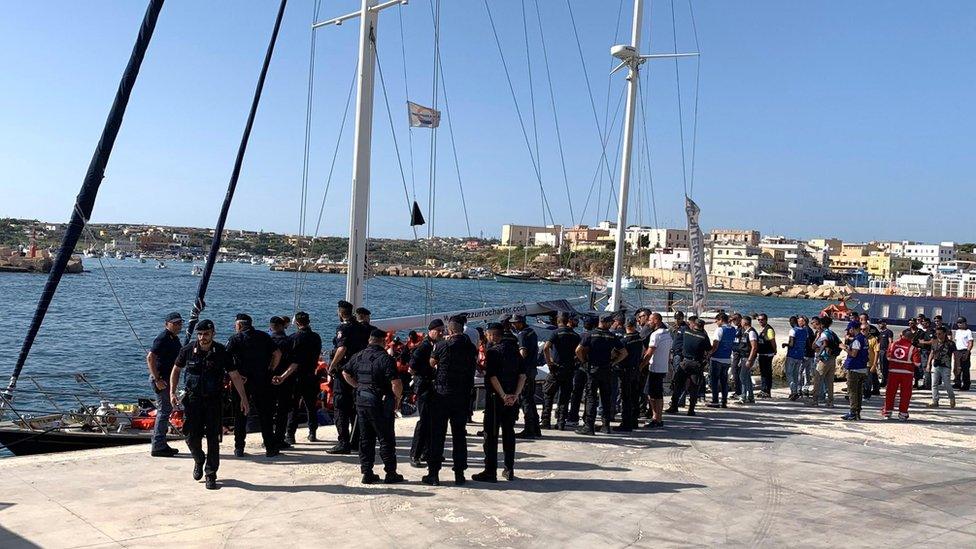
Police waited next to the Alex before anyone disembarked
Meanwhile, another NGO ship, the Alan Kurdi - operated by German charity Sea-Eye - announced it was now sailing to Malta after following the Alex towards Italy, external.
Why is Italy refusing permission to dock?
Italy has been one of the main destinations for migrants attempting to reach Europe via the North Africa route, mostly from Libya.
People smugglers often load inflatable dinghies and other craft unsuited to the journey with dozens of people, many of which end up adrift and in need of rescue.
Mr Salvini, from the right-wing League party, takes a hardline stance against migrants and rescue ships - something that has seen both his and his party's popularity increase.
In February, it was reported that Italy had rejected a record 24,800 asylum applications between October 2018 and January.
And a poll published in the Italian newspaper Corriere Della Sera on Saturday said 59% of Italians approved of Mr Salvini shutting Italy's ports off to NGO-run vessels.
Last month, new laws passed by his government by emergency decree created fines of up to €50,000 (£45,000; $56,000) for vessels that sail to Italian ports without permission.
Yet just a week ago, a different ship, the Sea-Watch 3, forced a landing on Lampedusa after being stranded at sea for two weeks. Its captain, Carola Rackete, was arrested and accused of endangering the lives of police and trying to sink their boat.
A judge ordered her freed, though she still faces separate charges of aiding people smugglers and resisting authorities.
German sea captain Carola Rackete is arrested in Lampedusa after migrant rescue in Mediterranean
The interior minister insists that such boats be intercepted instead by the Libyan coast guard, which has received EU funding to boost its capabilities.
However, the Italian judge in Ms Rackete's case ruled that neither Libya nor Tunisia were safe countries for migrants.
When the Alex announced its intention to land at Lampedusa on Saturday, Mr Salvini took to Twitter to declare law enforcement agencies "ready to intervene".
In an apparent reference to the court order which freed Ms Rackete, he added: "In a serious country, arrests and seizure... would be immediate: what will the judges do this time?"
Italian newspaper La Repubblica reported that the League Party has now proposed raising fines to up to one million euros, external, and to make it easier to seize ships.
Why are ships heading to Italy specifically?
Italy is often the closest EU country when migrants are rescued off the coast of Libya.
Many rescue ships and organisations do not consider Libya a place of safety under applicable international law.
When the Alan Kurdi announced it was following the Alex to Lampedusa despite the risk, it tweeted: "We are not intimidated by a Minister of Interior but instead head towards the nearest port of safety."
"The law of the sea applies, even when some government representatives refuse to believe that."
Allow X content?
This article contains content provided by X. We ask for your permission before anything is loaded, as they may be using cookies and other technologies. You may want to read X’s cookie policy, external and privacy policy, external before accepting. To view this content choose ‘accept and continue’.

Earlier this week, migrants being held in a detention centre - which is where many returned migrants end up - were killed in an attack which hit the building they were in.
Those who make the journey across the water are also at risk - with many boats sinking or ending up adrift.
The International Organization for Migration (IOM) estimates that 681 people have died in the Mediterranean Sea so far in 2019 – 426 of them in the central region between Libya and Tunisia and Italy.
- Published6 July 2019
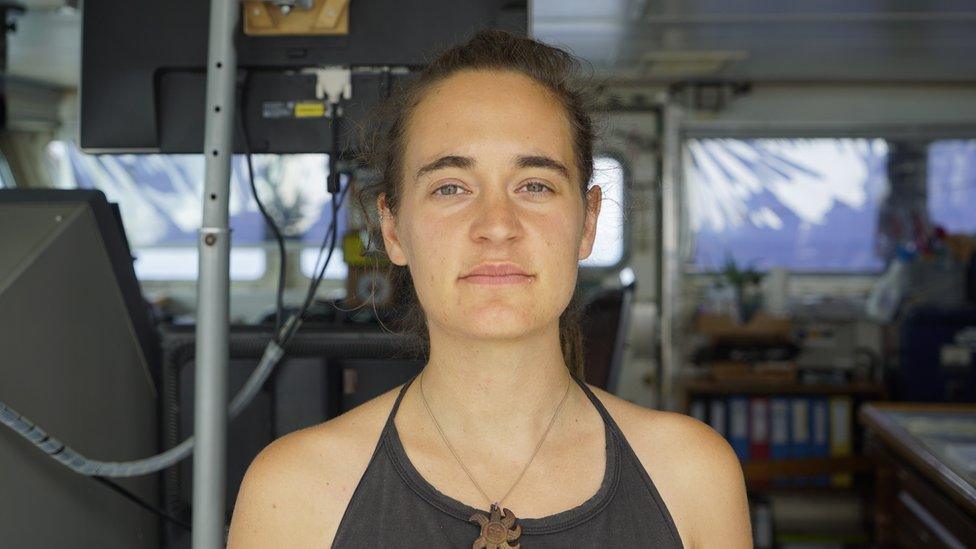
- Published12 June 2019
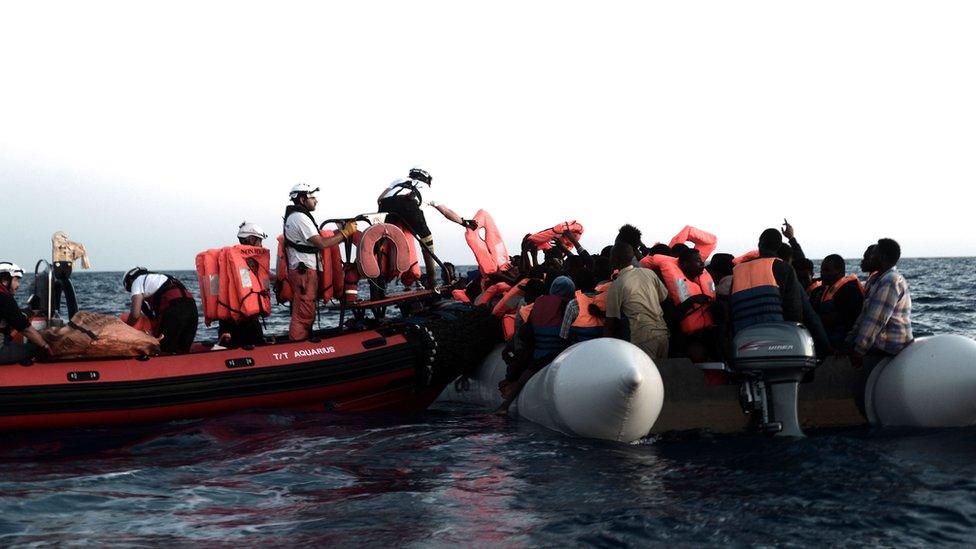
- Published24 September 2019
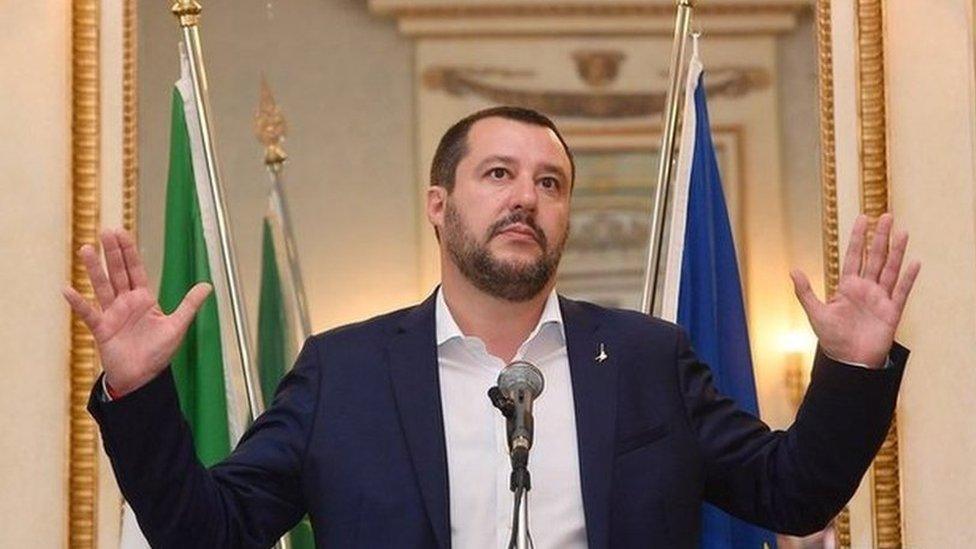
- Published26 February 2020
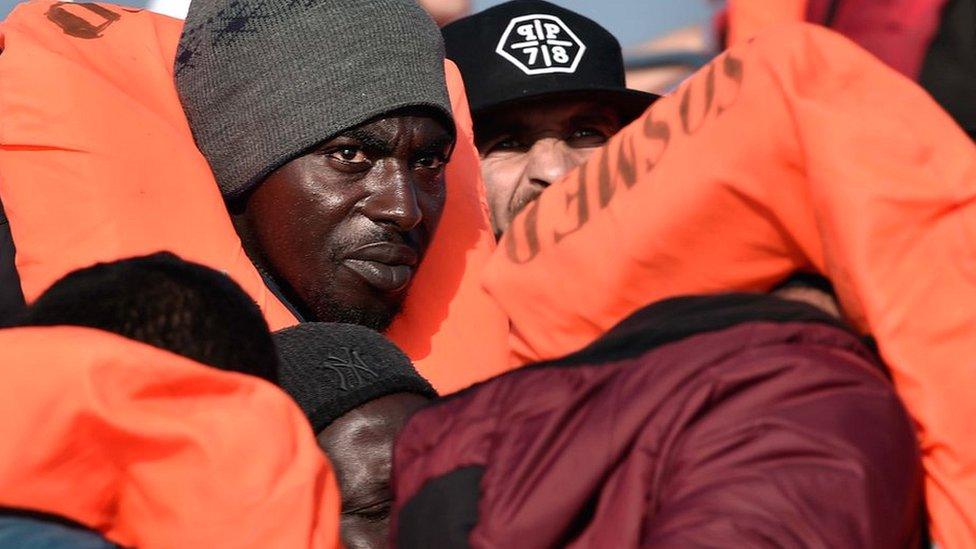
- Published13 June 2018